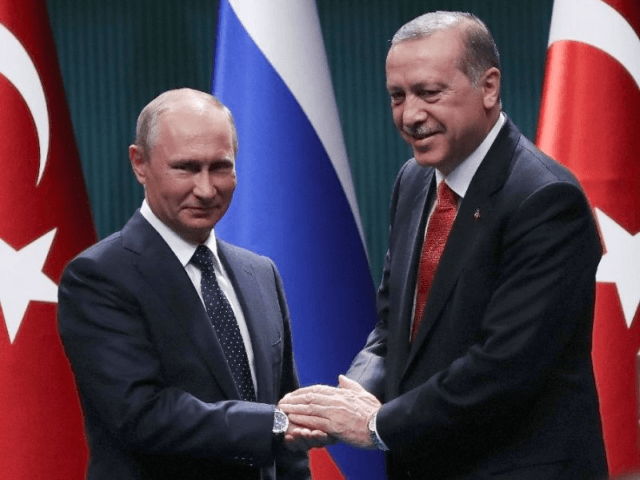Russian President Vladimir Putin traveled to Ankara this week to discuss the ongoing war in Syria with his Turkish counterpart, marking the latest sign of an improving relationship between the two countries that is prompting concerns in the West.
Although Turkey and Russia have found themselves on different sides of the six-year-old Syrian conflict, the two nations have made efforts to strengthen their relationship in recent months as the war continues to drive a wedge between NATO allies Washington and Ankara.
“Russia and Turkey are cooperating very tightly,” Dmitry Peskov, a spokesman for President Putin, said ahead of the one-day visit by the Russian leader to Ankara, reports the Agence France-Presse (AFP) agency.
After their meeting in Ankara on Thursday, the two leaders indicated that they agreed to cooperate closely to end Syria’s civil war, which has been raging since 2011, reveals Radio Free Europe/Radio Liberty (RFE/FL).
Moscow and Ankara will work to “deepen coordination” on ending the six-year-old war, reportedly declared President Putin during a joint press conference with Turkish President Recep Tayyip Erdogan, adding that the “necessary conditions” now existed to end the conflict.
Turkey “will continue close cooperation with Russia for reaching a political solution to the crisis in Syria,” added Erdogan.
For months, Moscow and Ankara have been pushing for the establishment of four “de-escalation zones” in Syria to end the civil war, an effort that has been declared a failure by the United Nations.
Nevertheless, the Turkish leader indicated that they agreed to “pursue more intensely” the creation of a “de-escalation zone” in Syria’s Idlib Province.
“Readiness was confirmed to comply with the final agreements on creating four de-escalation zones, including the biggest of them in Idlib Province,” explained the Russian president.
According to AFP, the two presidents were expected to discuss an already signed deal allowing Turkey to purchase $2 billion-worth of S-400 air missile defense systems from Russia, a move that has shocked Ankara’s fellow NATO members.
In Syria, Turkey has been lending support to rebels fighting to overthrow the country’s dictator Bashar al-Assad.
Meanwhile, Russia has joined Iran in backing the Syrian regime, allowing the dictator to reverse the tide of the conflict and remain in power.
However, “while Turkey’s policy is officially unchanged, Ankara has notably cooled its attacks on the Damascus regime since its cooperation with Russia began to heat up,” notes AFP.
As the Syrian war continues to drive U.S. and Turkey apart, the relationship between Moscow and Ankara has improved in recent months.
Citing U.S. support for the Kurdish People’s Protection Units (YPG), Ankara threatened to shut off America’s access to Turkey’s Incirlik Air Base, which is used to carry out U.S.-led airstrikes against the Islamic State (ISIS/ISIL) in Iraq and Syria.
Turkey considers the YPG—the armed wing of the Democratic Union Party (PYD) that controls large swathes of northern Syria—to be affiliated with the Kurdistan Workers Party (PKK).
Ankara and Washington have designated the PKK as a terrorist group, but the United States continues to support the YPG.
As the U.S.-Turkey alliance has deteriorated, Moscow and Ankara have engaged in efforts to mend their relationship, which fell apart after the Turkish military shot down a Russian plane over Syria in November 2015.
Russia and Iran met with pro-Syrian opposition Turkey in Moscow and agreed to work on drafting a peace deal and to serve as “guarantors” of any future resolution between Damascus and rebel fighters, revealed the Kremlin’s foreign minister (FM) in December 2016.
Nevertheless, Moscow and Ankara recently appeared to once again find themselves on different sides of a conflict in the Middle East—Iraqi Kurdistan’s efforts to become an independent country.
Joining Iraq, Iran, Syria, and even the United States, Turkey expressed opposition to Kurdistan’s independence referendum, which passed on Monday.
On the other hand, Russia stopped short of urging Kurdistan to halt its independence vote, unlike the United States and other world powers.
The Russian foreign ministry reportedly said Wednesday it “views the Kurds’ national aspirations with respect,” adding that it supports the territorial integrity of Iraq.
In July, the Russian foreign ministry expressed a similar position, saying Kurdistan “must be” allowed to hold its independence vote.
Despite the differences between Moscow and Ankara, “economic cooperation is also beginning to flourish with Russian tourists returning to Turkey and the two countries working on a Black Sea gas pipeline,” points out AFP.
“Yet analysts say that while both countries share an interest in seeking to discomfort the West by showing off close cooperation, their relationship falls well short of a sincere strategic alliance,” it adds.

COMMENTS
Please let us know if you're having issues with commenting.